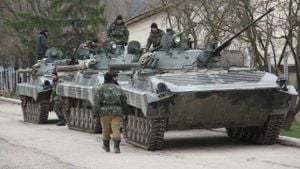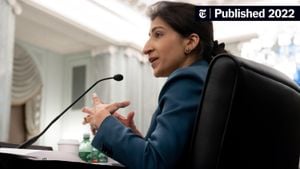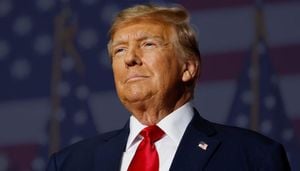President-elect Donald Trump has appointed retired General Keith Kellogg as the special envoy to Ukraine and Russia, igniting fresh discussions about U.S. foreign policy amid the protracted conflict. This announcement, made on November 27, 2024, marks Kellogg's significant return to the political spotlight—he served as chief of staff for Trump’s National Security Council during the former president's first term.
Kellogg's role is expected to be pivotal as the U.S. approaches nearly three years since Russia's military invasion of Ukraine began. Trump expressed confidence in Kellogg's capabilities, stating he has had distinguished military and business experience, and emphasized the goal of achieving "PEACE THROUGH STRENGTH"—a phrase reminiscent of Kellogg's earlier high-level military roles.
Despite the appointment, questions loom over Trump's commitment to U.S. support for Ukraine, particularly concerning military aid. During his time as vice president, Kellogg witnessed firsthand the intricacies of national security, providing him with insights likely to shape his approach to the complicated dynamics between Ukraine and Russia.
Trump has historically criticized the Biden administration's support for Ukraine, which has included over $64 billion in military aid since the start of the invasion. The former president has positioned himself as someone capable of swiftly resolving the crisis, asserting he could have the conflict settled before even taking office.
During the campaign, Trump compared Ukrainian President Volodymyr Zelenskyy to "the greatest salesman of all time" for continuously seeking U.S. support. While he has pledged to work closely with Zelenskyy, there’s underlying apprehension within Ukraine about Trump’s intentions. They fear prospective negotiations may not align with their goals, especially if it results in reduced aid or deals favoring Russia.
Kellogg co-authored a strategy paper earlier this year, outlining potential approaches for resolving the conflict. The paper suggests U.S. military support to Ukraine should be contingent on Ukraine’s participation in peace talks with Russia. This plan includes seeking a ceasefire, simultaneously ensuring continued military assistance to bolster Ukraine’s defenses.
Trump’s approach diverges sharply from many international leaders, who argue against any ceasefire negotiations perceived as beneficial to Russia. Under the Biden administration, U.S. aid has focused on empowering Ukraine to reclaim lost territories, reinforcing their sovereignty amid the Russian advance.
Kellogg and his co-author, Fred Fleitz, noted the enduring risk posed by President Putin, arguing for the necessity of negotiations, even as they acknowledged the difficulty of achieving lasting peace under his current leadership.
This recent announcement also highlights significant political shifts as the Republican Party assumes control of both chambers of Congress. With Trump back at the helm, the party’s foreign policy direction is already generating chatter. Figures like Vice-president-elect JD Vance have echoed Trump's sentiments against excessive financial support for Ukraine, urging for diplomatic negotiations instead.
Despite the skepticism surrounding Trump's dealings with Ukraine, Kellogg’s appointment could potentially reshape how the U.S. engages with both Kyiv and Moscow, particularly as tensions remain high and the stakes grow ever higher as winter descends upon the region.
Former National Security Adviser H.R. McMaster commented on the urgency of upcoming months for Ukraine, stressing both nations may seek to bolster their positions militarily before Trump’s administration implements new strategies. This presents a time-sensitive opportunity for both sides to make substantial military gains.
Meanwhile, Kellogg's previous experience can help navigate these tumultuous waters. Having worked closely with Pence and Trump previously, he is well-versed with the administration's inner workings. His history suggests he might run negotiations with the firmness and determination needed to tackle this complex geopolitical challenge.
The Kremlin, observing these developments, has already responded favorably to Trump’s claims of being able to settle the war. Reports indicate they await more defined strategies from Trump, particularly how he intends to balance U.S. military support for Ukraine against potential pressures to negotiate with Russia.
Ukraine's response to Trump’s re-election and Kellogg’s appointment has been cautious yet pragmatic. Former Ukrainian Foreign Minister Dmytro Kuleba remarked on Trump's previous insights about fixing the conflict as he has taken sensible steps without over-explaining his plans. This indicates the hope for effective U.S. engagement continues to persist on the Ukrainian side—yet at the same time, there’s trepidation about historical dealings with Trump.
With Trump and Kellogg now at the forefront of U.S. foreign policy, the world watches closely. Their approaches could drastically alter the balance of power, impacting not only Ukraine and Russia but the overall stability of international relations moving forward. Both will have to navigate diplomatic interests delicately as they attempt to achieve the lofty goal of peace amid prolonged warfare.
From previous leaders' missteps to open-ended conflicts, the upcoming administration's choices will resonate for years to come, possibly determining the trajectories of U.S. alliances and military involvement on the world stage itself.
Can Trump and Kellogg bring the change they promise, and if so, what will it look like? It’s clear, regardless of outcomes, this is just the beginning of yet another chapter within international diplomacy where every detail counts—both for Ukraine and beyond.



